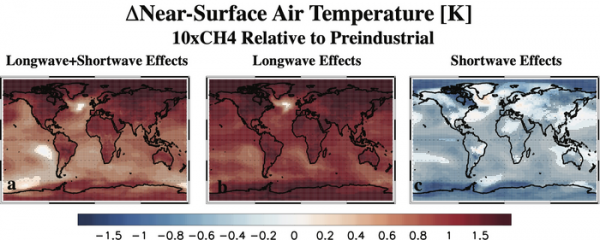Methane, a potent greenhouse gas, creates a blanket in the atmosphere that traps longwave energy (heat) from Earth’s surface, preventing it from radiating out into space, making the planet hotter. However, researchers at UC Riverside have discovered that methane also creates cooling clouds that offset 30% of the heat. This effect is not accounted for in most climate models. The researchers used computer models to simulate both longwave and shortwave methane effects and found that shortwave absorption by methane decreases the amount of solar radiation reaching Earth’s surface, which reduces the amount of water that evaporates. Precipitation and evaporation are usually equal, so a decrease in evaporation leads to a decrease in precipitation. The research team wants to conduct additional experiments to learn how different concentrations of methane impact the climate. Scientific interest in methane has grown as levels of emissions have increased, and much comes from industrial sources, agricultural activities, and landfills. Methane emissions are also likely to increase as the Arctic’s frozen ground thaws.
Surprise effect: Methane cools even as it heats
The UC Riverside has recently discovered that methane has a surprising effect on Earth’s atmosphere. While methane traps a considerable amount of heat, it also creates cooling clouds that offset 30% of the heat. Most climate models do not account for this new discovery.
Methane is a greenhouse gas that creates a kind of blanket in the atmosphere. This blanket traps longwave energy (heat) from Earth’s surface, preventing it from radiating out into space, making the planet hotter. However, methane also absorbs shortwave energy (incoming energy from the sun), which should warm the planet, but counterintuitively encourages changes in clouds that have a slight cooling effect.
The research project, led by UCR assistant professor of Earth sciences, Robert Allen, was detailed in the journal Nature Geoscience. The study found that accounting for the absorption of shortwave energy suppresses the increase in precipitation by 60%. Methane generally increases the amount of precipitation, but by holding on to energy from the sun, methane is introducing heat that the atmosphere no longer needs to get from precipitation.
The atmosphere needs compensation for the escaped energy from both types of energy (longwave and shortwave), which escape more than they are absorbed into it. It gets compensation from heat created as water vapor condenses into rain, snow, sleet, or hail. “Essentially, precipitation acts as a heat source, making sure the atmosphere maintains a balance of energy,” said study co-author Ryan Kramer, a researcher at NASA Goddard Space Flight Center and the University of Maryland, Baltimore County.
Methane changes this equation by introducing heat that the atmosphere no longer needs to get from precipitation. Additionally, methane shortwave absorption decreases the amount of solar radiation reaching Earth’s surface, which reduces the amount of water that evaporates. Precipitation and evaporation are usually equal, so a decrease in evaporation leads to a decrease in precipitation.
The implications of this discovery are significant for understanding in more detail how methane and other greenhouse gases can impact the climate system. Shortwave absorption softens the overall warming and rain-increasing effects, but it does not eradicate them entirely.
Methane’s Effect on Climate Needs More Study
UC Riverside researchers used detailed computer models to simulate both longwave and shortwave methane effects, discovering that methane has a surprising effect on Earth’s atmosphere. They want to conduct additional experiments to learn how different concentrations of methane impact the climate.
Scientific interest in methane has grown as levels of emissions have increased. Industrial sources, agricultural activities, and landfills contribute to methane emissions, which are also likely to increase as the Arctic’s frozen ground thaws.
Xueying Zhao, a UCR Earth and planetary sciences Ph.D. student and study co-author, said that methane has become a major concern and that researchers must incorporate all known effects into climate models to better understand its impact. Ryan Kramer, a researcher at NASA Goddard Space Flight Center and the University of Maryland, Baltimore County, said that their work is getting them closer to understanding what methane’s concentration means for the planet.
Don’t miss interesting posts on Famousbio










